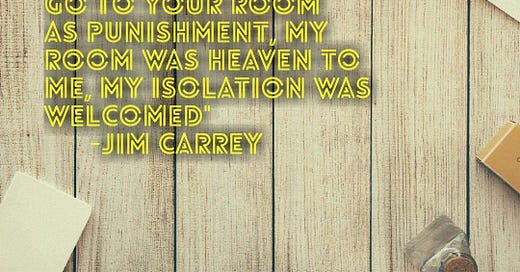I was re-reading Quiet: The Power of Introverts in a World That Can't Stop Talking, about the rather remarkable changeover in our national character from relatively introverted personalities, largely of English, Dutch, and Germanic heritage in the early years of the Republic, to the more outgoing extroversion displayed by Americans today.
Extroversion is considered to be the ‘healthy norm’ for Americans. It’s the expected default for well-adjusted schoolchildren. A child without many close friends is thought to be deficient; the ‘cure’ is to teach that child how to make connections with other people more easily.
The current image of a person not at ease in groups is:
A loner, capable of horrifying violence, should he be triggered
Not promotable, no matter how well that person performs on the job
Someone to put a ‘diagnosis’ on; someone who can be labeled (and, thanks to pop culture awareness of the label of Autism, someone people feel comfortable labeling and than ignoring after)
Different, deficient
Someone who may NEVER find a person to love
All of which is untrue, stereotyping, and - ultimately - capable of causing great cruelty to those less comfortable in many social settings.
Lately, there has been a trend to describe people with SOME of the characteristics describing autism as ‘being on the spectrum’. Most of the people so labeling others have no training in diagnosis, and may easily confuse those who are simply ignorant of the social graces, ill at ease in crowds by nature or by cultural upbringing, or SHY, with those who have a medical condition.
I’m generally an introvert - defined as one who has a strong NEED to recharge their soul by spending time alone. That can be allied with lack of ease in social situations, however, that tendency can be somewhat corrected with training on the ‘social graces’ and experiences.
True introverts CAN be sociable, even in large groups. That isn’t generally their preference. Introverts are happiest alone, or with one or a few good friends.
I have learned to be more at ease in larger groups. As a teacher, business owner, and family member, I forced myself to learn social customs and norms well enough to manage my innate unease. Many who know me think of me as a ‘people person’. And, I can be - for limited times.
The larger the gathering, the more I crave quiet time by myself. Typically, I find that I enjoy traveling home by myself (or, being the driver in a car of sleepy, tired people). When driving, it’s not unusual for me to not even bother turning on the radio, no matter how long the trip.
This amazes my husband, for whom noise is the preferred state of being. He is happiest with the radio on at a high volume, and with someone to talk to (often simultaneously - very jarring and difficult for me, particularly with my hearing loss).
Lately, we’ve been binge-watching Sue Thomas, FB-Eye. The show is based on a true story, about a deaf woman with good lip-reading skills, who works for the FBI. He enjoys it, and we often watch it together.
In one episode, Sue and her hearing friend attend a meeting composed of deaf people. Sue is comfortable with the interactions, and does work to help her friend fit in. But, often, the conversation flows much more readily than her friend can manage, with her limited sign language skills.
Later, that friend has an epiphany when Sue is equally uncomfortable in a group of people who hear. Sue misses parts of conversations, and is excluded when the speaker is not facing her.
When I saw that, I explained that such an experience was very common with me, particularly when it was noisy. Since then, he has made a greater effort to turn down the noise in the room when he wants to talk to me - and his efforts have been both helpful AND appreciated.
But, my hearing loss aside, I still prefer the quiet of my own thoughts.
Extroverts just cannot understand that preference. For many of them, alone time is torture.
Not for true introverts (Many would find it amazing that Carrey considers himself an introvert, but not all introverts are incapable of performing in public).
I believe that the term Autism is overused when describing people. It seems that one of the reasons that it is applied is that, if so labeled, rather than trying to CHANGE introverts, people will accept that they should be valued just as they are. For many introverts, being labeled is preferable to a lifetime of people trying to ‘help you get out of your shell’.




